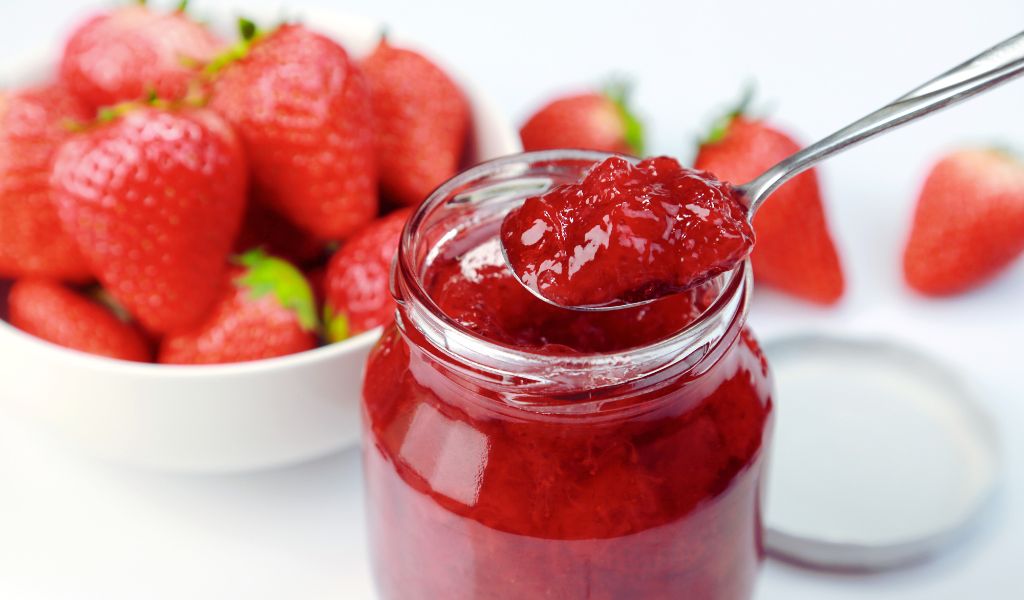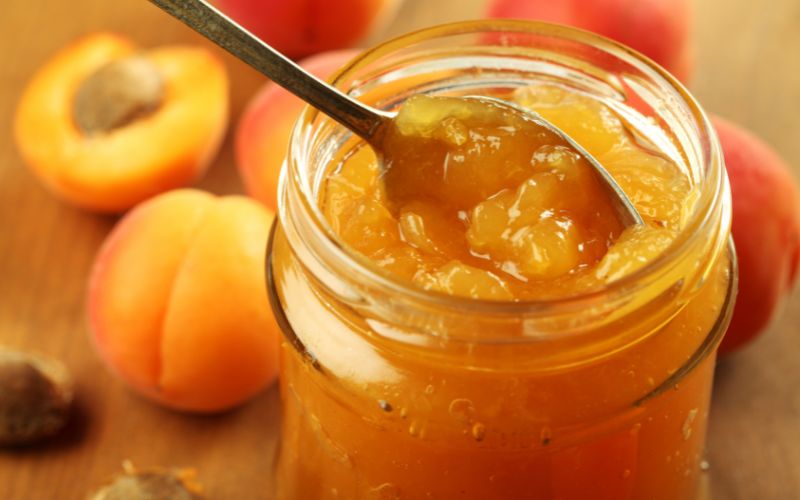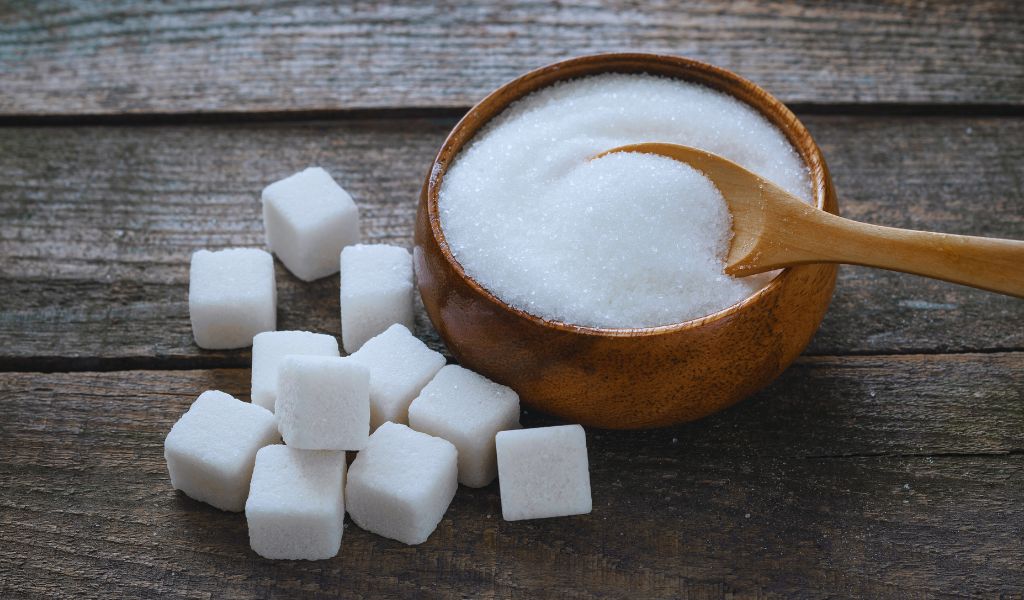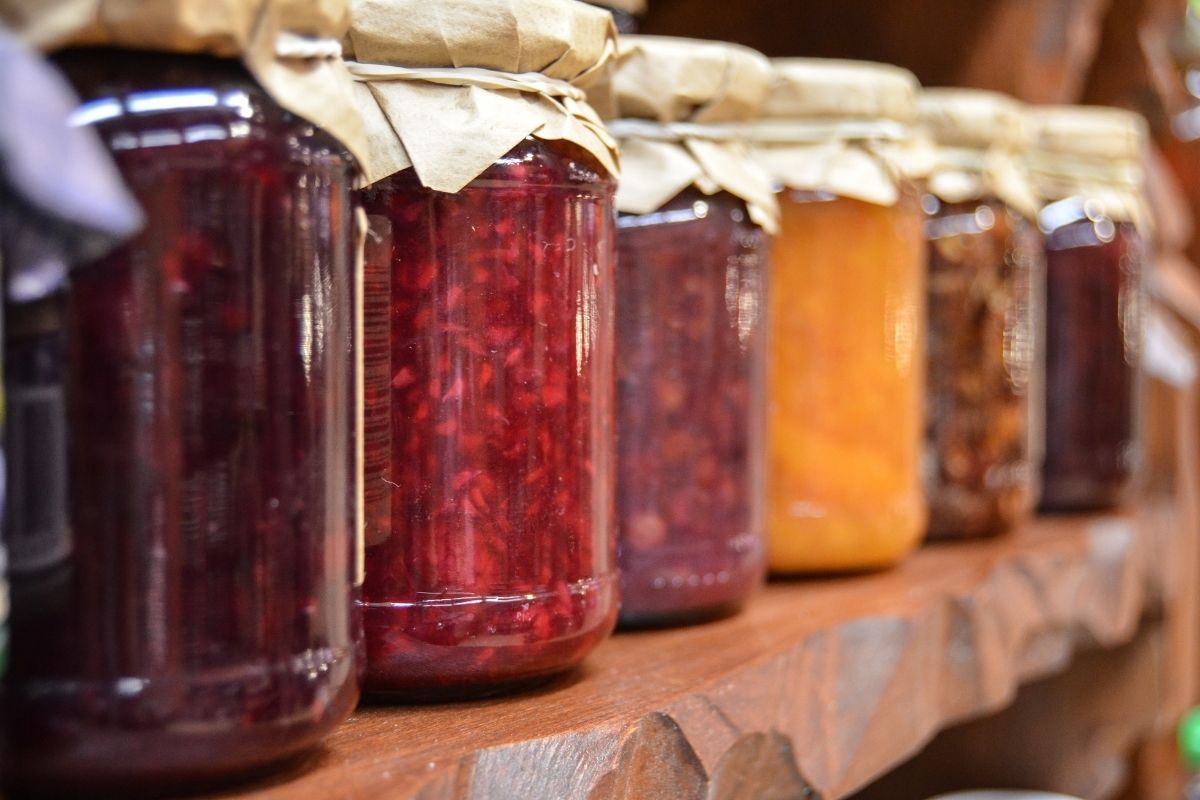No, jam is not safe to feed to dogs. Jam is generally loaded with sugar, preservatives and often contains artificial sweeteners which can be poisonous to dogs. Additionally some fruits contained in jam, such as grapes, can be deadly. Do not feed jam to dogs.
As a dog owner there is every chance that, at some point, you have spoiled your dog with a human type treat and, maybe this is a frequent event.
It’s tempting to give our dogs a variety of foods that might just not be the best for them, simply because we want to treat them and one thing that many people wonder is that of jam.
Why jam is bad for dogs
Jam is high in sugars, which can lead to obesity and dental problems in dogs.
Some jams may also contain artificial sweeteners, preservatives, or other additives that are not safe for dogs.
A typical sweetener is Xylitol – safe for humans but absolutely deadly to dogs.
Moreover, certain types of jam may contain ingredients that are toxic to dogs, such as grapes, which can cause kidney failure in dogs.
If you wish to give your dog a sweet treat, consider offering fruits that are safe for dogs, like apples (without seeds) or blueberries, in moderation.

My dog likes jam can he have a little?
Seriously, it’s best not to give jam to your dog, but, if this is too difficult to take then:
Only ever give organic jam to a dog, one that contains no additives, preservatives or artificial sweeteners and then only in very small amounts on rare occasions.
Remember that even an organic jam will contain high levels of sugar which itself can cause health problems for your dog if he eats too much.
What should I do if my dog has eaten jam?
First, you have to check your dog for any allergic signs such as hypersalivation/excessive drooling, watery eyes, difficult breathing or inflammation at any part of the body.
If your dog has not shown any of these symptoms, your dog is fine, and you do not have to worry much.
Next, you check the ingredients of jam. If the product contains Xylitol or grapes, contact a veterinarian or poison helpline immediately whether your dog shows any sign or not.
If it’s just sugar, gelatin, and berries (not grapes), chances are your dog will recover, but they may face some vomiting and diarrhoea.

Can dogs eat strawberry or raspberry jam?
If it contains no Xylitol, it should not be fatal, but both of these jams have high sugar levels, which can still be bad for dogs.
If your dog is interested in strawberry or raspberry jam, try any alternative or offer some fresh fruit.
Fresh fruits such as strawberries are safe for dogs if given in moderation and have anti-inflammatory and antioxidant properties.
Can dogs eat grape jam?
No, grapes can be fatal to dogs because they contain substances that dogs cannot metabolize and any type of grape based product including jams, juice, raisins etc can be fatal to a dog if eaten.
Grapes can cause kidney damage and, in severe cases, cause sudden death.
Typical ingredients of jam along with their benefits and side effects
Dogs don’t need any sweeteners or sweet treats because they are carnivores, i.e. eat meat.
However, they need some form of sugar for their normal metabolism. They get their sugar from carbohydrates such as vegetables, sweet potatoes, grains, etc.
But they should never really eat human desserts, cakes, chocolates, or raw sugar.

Side effects of sugar
Obesity: Foods with high sugar content are usually high in calories. These are empty calories that don’t fulfil your canine’s hunger, meaning your dog will keep eating.
It can easily lead to weight gain. Excess weight can significantly affect your dog health, including heart conditions, joint problems, and lethargy.
Vomiting and diarrhoea: Any new food or abrupt diet change can cause stomach upset in dogs. It is not uncommon for canines to experience vomiting and diarrhoea after eating sweet food or treats.
Hyperactivity: Dogs are generally less tolerant of sugar than humans. This means that only a small amount can cause a behaviour change, often in the worst-case scenario.
Dental health: Sugar reacts with bacteria to produce acid, which destroys teeth. A high sugar diet can cause tartar, cavities and dental work for your canine companion.
Fruit: Jams contain many fruit flavours. Some raw fruits are healthy for dogs ( low-calorie treat) if given in moderation, while other high-calorie fruits can be deadly for them.
Below are the most popular and standard varieties of fruits which are toxic or compatible with canines
Grapes: Toxic for dogs. Avoid at all costs. Even single grape may be toxic.
Raspberry: Suitable for dogs. In moderation, raspberries are good for canines, especially for senior dogs, as they can help with joint problems.
BlackBerry: Suitable for dogs. Blackberries are full of vitamin E and antioxidants and can rarely be given to your dogs.
Strawberry: Suitable for dogs. Strawberries are low in calories and act as an excellent option for a low-calorie dog treat.
Apricot: Suitable for dogs. As long as they are deseeded, small amounts of apricot treats are healthy for dogs.
But be careful apricots contain small cyanide amounts, which can be fatal if eaten in large quantities.
Many fruits are suitable for dogs. However, they should be fed raw instead of via jam.
Xylitol- What you should understand
Xylitol is an artificial sweetener.
Xylitol is used as an alternative to sugar and commercial jam companies commonly use this product in jams and jellies because it contains 40% less sugar but has the same sweet taste.
Xylitol decreases blood sugar level and causes hypoglycemia which can be life-threatening. It can be deadly to dogs.
Those dogs who eat Xylitol accidentally, usually show signs of poisoning within 15-50 minutes.
Symptoms of xylitol poisoning
Liver failure
Vomiting
Seizures
Lethargy
Being unsteady with any posture
Coma
If you think that your dog has eaten something that contains Xylitol, you should call your vet as soon as possible.
THE RISKS OF FEEDING JAM TO DOGS
Feeding jam to dogs carries several risks due to its ingredients and nutritional content. Here are some of the primary concerns:
- Sugar Content
Obesity: Jams are high in sugar, which can contribute to obesity in dogs if consumed in excess.
Dental Problems: High sugar content can also lead to dental issues, such as cavities and gum disease. - Artificial Sweeteners
Xylitol Toxicity: Some jams contain xylitol, an artificial sweetener that is extremely toxic to dogs. Even a small amount can cause rapid insulin release, leading to hypoglycaemia (low blood sugar), seizures, liver failure, or even death. - Fruit Toxicity
Grapes and Raisins: Some jams, like grape jam, are made from fruits that are toxic to dogs. Grapes and raisins can cause kidney failure in dogs.
Other Fruits: Some other fruits used in jams might also be harmful to dogs in large quantities or if they consume the pits or seeds. - Gastrointestinal Issues
Upset Stomach: The high sugar content and certain fruits can cause an upset stomach, leading to vomiting or diarrhoea.
Pancreatitis: Regularly consuming high-sugar and high-fat foods can contribute to the development of pancreatitis, an inflammation of the pancreas. - Allergic Reactions
Allergies: Some dogs might be allergic to certain fruits or other ingredients used in jams.
Skin Conditions: Allergies can also manifest as skin conditions, such as itching, redness, or swelling. - Choking Hazard
Fruit Pieces: Some jams contain chunks of fruit that might pose a choking hazard, especially for smaller dogs. - Behavioural Issues
Hyperactivity: The high sugar content might lead to temporary spikes in energy, causing hyperactivity or restlessness.
Begging Behaviour: Feeding human food like jam can encourage begging behaviour and selective eating. - Nutritional Imbalance
Poor Nutrition: Jam does not provide any nutritional benefits for dogs and can contribute to a nutritional imbalance if fed regularly.
FAQs
Can I feed my dog jam?
Generally, it is not recommended to feed your dog jam. Most jams are high in sugar which can lead to weight gain, diabetes, and dental problems in dogs. Additionally, some jams may contain artificial sweeteners, particularly xylitol, which is highly toxic to dogs.
What happens if my dog accidentally consumes jam?
If your dog accidentally consumes a small amount of jam, it may not cause immediate harm but might lead to upset stomach or diarrhea due to the high sugar content. However, if the jam contains xylitol or any other toxic ingredients, your dog could experience severe health issues such as hypoglycemia or liver failure. In such cases, it’s essential to contact a vet immediately.
Is there any safe alternative to jam for my dog?
If you want to give your dog something sweet and fruity, consider providing them with small amounts of fresh fruits like blueberries, apples (without the seeds), or bananas. Always consult with your vet before introducing any new food into your dog’s diet.
Why is xylitol dangerous for dogs?
Xylitol is a sugar substitute found in many types of foods, including some jams. While safe for humans, it is extremely toxic to dogs. Even small amounts can cause a rapid drop in blood sugar (hypoglycemia), leading to symptoms like vomiting, loss of coordination, seizures, and in severe cases, liver failure or death.
How can I ensure my dog’s diet is safe and balanced?
The best way to ensure your dog’s diet is safe and balanced is to feed them high-quality commercial dog food, which is specifically formulated to meet all of their nutritional needs. If you want to give your dog treats or incorporate new foods, always consult your vet first. And remember to keep human foods, especially those containing harmful substances like xylitol, out of your dog’s reach.
It should be pretty clear that jam is not a good choice for a dog.
Don’t give jam to your dog. It is meant for humans and offers no benefits to dogs at all.
If you want to give your dog a nice treat then choose something that is produced for dogs and that is safe for them to eat.
There are lots of dog treats available for you to choose from and you will be able to easily find something suitable for your dog.
Jam is not good for dogs.




